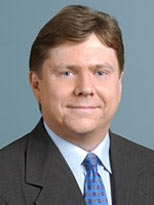An MIT expert on Iran's nuclear ambitions is gaining recognition for his work in developing a possible face-saving solution to the tense nuclear standoff between the United States and Iran.
Jim Walsh, research associate in MIT's Security Studies Program at the Center for International Studies, says the United States and Iran could develop significant common purpose if Iran's uranium enrichment program were managed and operated on Iranian soil by a multilateral consortiumand if the United States were to give up its demands that Iran abandon its nuclear activities completely.
Walsh developed his proposal with colleagues William Luers, former U.S. ambassador to Czechoslovakia and Venezuela, and Thomas Pickering, former U.S. ambassador to six countries including Russia and Israel and to the United Nations.
"This is a historic moment for U.S. leadership. Sanctions aren't working and Iran has accelerated its uranium enrichment. Multilateral management of Iranian nuclear facilities will provide transparency about their fuel program and reduce the chances of Iran acquiring nuclear weapons," says Walsh.
Walsh and his colleagues' proposal was recently featured in The New York Review of Books and in MIT's Audits of the Conventional Wisdom. The title is, "A Solution for the U.S.-Iran Nuclear Standoff."
Walsh also presented his research on Iran's nuclear ambitions to the Senate Committee on Homeland Security and Governmental Affairs on April 24, 2008. It was his third appearance before Congress to testify on U.S.-Iran relations.
Tensions about Iran's nuclear program, mounting for decades, have nearly boiled over this year. Multilateral management of Iran's nuclear program has been proposed before; Walsh's plan is drawing widespread interest now as many officials are looking for a way out of the potentially dangerous U.S.-Iran standoff, he notes.
Taking the lead on resolving the nuclear standoff would give the United States a chance to work with Iran on defeating the Taliban and al-Qaeda and on developing common goals in Afghanistan and Iraq, Walsh says.
Washington's historic momentthe opportunity to negotiate with Iran on managing its nuclear programarises from two recent propitious developments, Walsh says. First, the National Intelligence Estimates concluded in December 2007 that Iran halted its weapons program in 2003. Second, the United States and Iran have held successful direct talks on Iraq, reducing the flow of improvised explosive devices and foreign fighters through Iran.
"These events have created the political space for new thinking about the U.S.-Iran relationship, and they demonstrate that negotiations with the Iranian Republic can produce tangible results," the authors write.
Walsh and his colleagues have met regularly with Iranian academics and policy advisers over the past five years, and Walsh met twice with Iranian President Mahmoud Ahmadinejad during a U.S. visit. Walsh has visited Iran three times and will return there in June.
Tehran has changed since Walsh's first visit in 2006, illustrating the marginal effects of U.S. sanctions, in effect since the 1979 hostage crisis, he says.
"Wealthier neighborhoods don't look like they are suffering from sanctions. There's a construction boom, with new buildings and shops going up. One result of the new sanctions is that wealthy Iranians who had kept their money in foreign banks have brought it back to Iran; they're investing in real estate at home," Walsh says. "Nobody has stopped buying oil."
Sanctions have also been ineffective, according to Walsh, because they reflect a mismatch between U.S. policy and U.S. goals.
"Economic sanctions are a long-term strategy; they're not designed to achieve near-term goals like containing or dismantling a nuclear program. The United States needs to take the initiative in the near term," Walsh says.
Taking that initiative would quickly profit both the United States and Iran, he says. Through upgraded international safeguards and inspections, multilateral ownership and management will provide the United States transparency about Iran's production of nuclear fuel. In exchange for accepting the multilateral plan, Iran would be able to jointly own and operate an enrichment facility on its own soil and also enjoy increased trade with Europe, among other benefits.
"The process is likely to be painful and difficult, but the reward may be a more stable and peaceful Middle East," the authors write.
A version of this article appeared in MIT Tech Talk on May 21, 2008 (download PDF).






